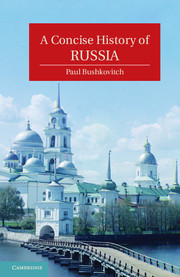Book contents
- Frontmatter
- Contents
- List of Figures
- Abbreviations
- Acknowledgments
- Prologue
- 1 Russia before Russia
- 2 Moscow, Novgorod, Lithuania, and the Mongols
- 3 The Emergence of Russia
- 4 Consolidation and Revolt
- 5 Peter the Great
- 6 Two Empresses
- 7 Catherine the Great
- 8 Russia in the Age of Revolution
- 9 The Pinnacle of Autocracy
- 10 Culture and Autocracy
- 11 The Era of the Great Reforms
- 12 From Serfdom to Nascent Capitalism
- 13 The Golden Age of Russian Culture
- 14 Russia as an Empire
- 15 Autocracy in Decline
- 16 War and Revolution
- 17 Compromise and Preparation
- 18 Revolutions in Russian Culture
- 19 Building Utopia
- 20 War
- 21 Growth, Consolidation, and Stagnation
- 22 Soviet Culture
- 23 The Cold War
- Epilogue
- Further Reading
- Index
20 - War
Published online by Cambridge University Press: 05 June 2012
- Frontmatter
- Contents
- List of Figures
- Abbreviations
- Acknowledgments
- Prologue
- 1 Russia before Russia
- 2 Moscow, Novgorod, Lithuania, and the Mongols
- 3 The Emergence of Russia
- 4 Consolidation and Revolt
- 5 Peter the Great
- 6 Two Empresses
- 7 Catherine the Great
- 8 Russia in the Age of Revolution
- 9 The Pinnacle of Autocracy
- 10 Culture and Autocracy
- 11 The Era of the Great Reforms
- 12 From Serfdom to Nascent Capitalism
- 13 The Golden Age of Russian Culture
- 14 Russia as an Empire
- 15 Autocracy in Decline
- 16 War and Revolution
- 17 Compromise and Preparation
- 18 Revolutions in Russian Culture
- 19 Building Utopia
- 20 War
- 21 Growth, Consolidation, and Stagnation
- 22 Soviet Culture
- 23 The Cold War
- Epilogue
- Further Reading
- Index
Summary
From the very beginning the Soviet leadership expected an invasion sooner or later. This conviction grew from the actual situation of the Soviet Union since the revolution, the experience of intervention and hostility of almost all other states, and also from their analysis of the world. For they expected not just an attack on their own country but a war among the western powers as well, and thought it likely that the war in the West would come first. Their analysis of the world came from Lenin's view of the most recent stage of capitalism, which he understood to be the period of imperialism. He believed that the First World War was the result of the increasing concentration of capital in the hands of a small number of massive semi-monopolistic corporations and banks, which in turn led to a speeded up competition for markets and resources. The result was the division of the world among great empires, and the desire of the late-comers in that process, Germany in particular, to re-divide the world. Thus, even without the existence of the USSR, another war was inevitable. Stalin and the Soviet elite accepted this conception of the world without any doubts, and their own historic experience in the First World War, as well as their observation of the various rivalries in the world after 1918, only strengthened their conviction. At the same time they realized that the differences (“contradictions”) among the capitalist powers might be temporarily shelved in an anti-Communist alliance or that one or more of the western powers might be strong enough to attack them on its own. Until 1933 the principle threat seemed to come from the British Empire, the apparently hegemonic power of the time. The Red Army constructed its war plans on the assumption that an attack would come from Poland and Rumania with British (and perhaps French) backing or even participation. The de facto military arrangements with Weimar Germany were designed in part to obstruct such an eventuality. When Adolf Hitler came to power in Germany in January of 1933, the Soviets confronted an entirely new situation.
- Type
- Chapter
- Information
- A Concise History of Russia , pp. 371 - 392Publisher: Cambridge University PressPrint publication year: 2011



